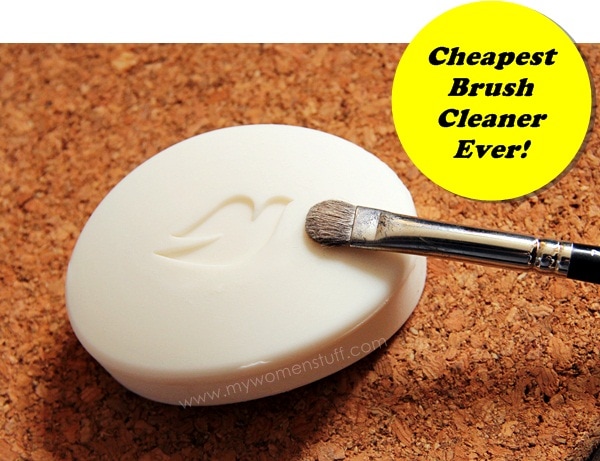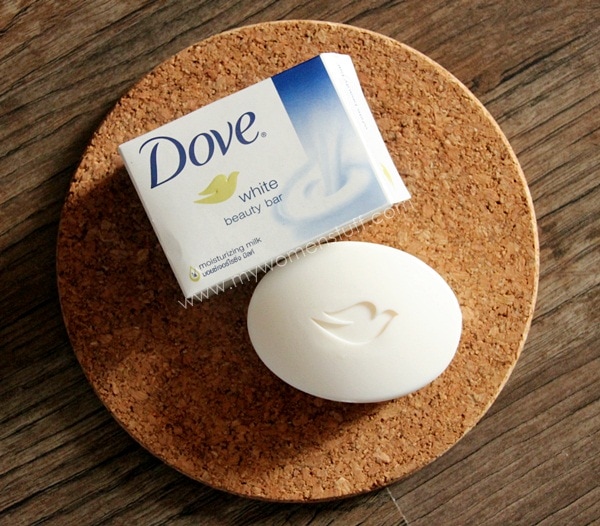
A while ago, reader Joy left a reply to another reader about how she was taught in makeup school, a cheap and effective way to clean her makeup brushes (Have I mentioned how I love it when you all chip in to help each other? I start picking up gems and tips too! 😉 ) It was effective, and importantly, did not break the bank. Makeup artists go through a lot of brushes each time so it would be costly to use a brush cleaner or detergent all the time. Here’s her comment :
Another cheaper way to clean your brush faster and more effectively. Try the bar soap from Marks and Spencer or Dove. Wet the brush and glide it over the bar soap till it is soapy and rinse off. Then leave to dry on a towel. *Use only the 2 bar soaps mentioned as any normal one will leave your brushes dry
I found what she said very intriguing. Soap! I never thought of that! Incidentally, I had run out of my Johnson & Johnson’s Baby Shampoo, So the next time I was out and about, I wandered down the soap aisle of the supermarket and came away with a bar of Dove soap. I opted for Dove because its (a) cheap and (b) cheap 😛 It was just slightly over RM2 so its fine if it didn’t work out. By contast, the small J&J shampoo is about RM6! So expensive! LOL!! 😛
But I have to say, Joy’s onto something because it does work a treat!
I bought the regular original White Dove mositurizing soap bar. Here’s a picture of the box. I don’t know if it looks the same everywhere in the world, but I went for the original because I didn’t want my brushes smelling of cucumber or what-have-you.

The smell is, a strong powdery scent that is quite typically Dove. If you have ever used the soap bar or its body wash, you’ll know how it smells.
So how I used it is simple:-
- Wet the brushes and the soap bar.
- Brush the surface of the soap bar a few times until the bristles gets soapy. It’ll lather up a little.
- Brush on my palm to dislodge the colour.
- Rinse
I found that it cleaned most brushes quite well, in particular if you use it for powder products. The brushes get clean quite easily. If your white bristle brushes are stained like in the picture above, then it doesn’t get it clean 100% but it gets the worst of it out. The only thing that can get it 100% white again is the Daiso detergent but I dislike that for natural hair. I’m not overly fussed as you might be able to tell, so long as its clean 🙂
For cream or liquid products, it can take longer and a bit of massaging of the bristles to get the residue out. So, for brushes that have very stubborn cream or liquid stuck on the bristles, a separate cleaner/detergent may be better. Dense brushes get clean quite well too. I was surprised that a dense kabuki type brush that I use for cheek stains/cream blush got clean quite easily. It was the concealer and foundation brushes that took the most work.
Does it dry out my brush bristles? Surprisingly, Joy was right. It doesn’t. I used this about 3-4 times to be sure and the natural hair bristles still feel quite nice. When it dries, its quite soft and the smell of the soap lingers a bit which is fine by me.
When I’m done washing my brushes, I just rinse the bar of soap, place it on a piece of sponge or in a soap dish until I need to use it again. I reckon a full bar could last a really long while. For the price I pay for a small bottle of J&J baby shampoo, I could get 3 bars of Dove soap. Talk about being economical!
So there we have it. Dove bar soap – the cheapest brush cleaner I have ever come across, that works without killing my brushes. Its cheap and effective and my brushes feel quite fine 😀
If you choose to try this, do share if it works for you too 😀
Paris B
Note: As per Joy’s comment, other soaps may dry out your brushes so she recommends only using either the Dove bar soap or the bar soap from Marks & Spencer (which I’m not familiar with)


Thank you Paris for this tips! This really helps 🙂
Because of your article I bought the Dove soap and tried to clean my brush. It works 🙂 Thank youuu
Yay!! So happy that it worked for you. It’s super cheap too! 😀
I have a confession to make. I’ve been deep cleansing all of my synthetic brushes with anti-bacterial liquid gel dish soap + olive oil and it didn’t cause any irritation on my skin. It was kind of hard to get the anti-bacterial sort dish gel soap though that I even thought about adding a drop of dettol in the solution if I can’t find any.
I use wet tissue to spot clean my foundation brush daily.
Its good to know that it works for you Trah 🙂 I have read about using dish washing liquid for brushes but I personally am a bit afraid too because I’m afraid it’d spoil my brushes. As it is, my hands can’t even tolerate dishwashing liquid so I use gloves 😀 But I guess a gentle one may work.
gonna try this! Thanks for sharing!
Hope it works for you!
catching up on your posts as I have been extremely bz. i love this post because i was always embarassed to say that all these while, i had always been using the lux bar soap to cleanse my brushes and make up sponges. yes, it works brilliantly! and so clean!!
No need to be embarrassed, Juan! We all have our little secret tips and tricks! 😉 Glad to know that Lux does the job for you. After Joy said to just stick with the 2 soap brands she mentioned, I decided not to be too adventurous 🙂
Just wanted to share.
I prefer scented moisturizing bar soap, it make my brush smells nice while applying on my face. For synthetic hair, which I usually use it with cream, foundation and concealer, I clean it with dishwashing soap first then the scented one.
I also mix cheap water-base eye makeup remover with unused toner 1:1 and keep it in a spray bottle for a quick cleaning. I big clean just once a week. I have been cleaning my brushes like this for a long time and my brushes still in good condition. I try to not damage the glue by soaking.
I have oily sensitive skin and used to breakout a lot but after avoid hand-touching my face and using brush for everything (cleaning it regularly), I hardly breakout anymore.